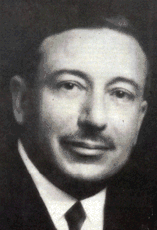Alberto Beneduce
Alberto Beneduce (29 May 1877 – 26 April 1944) was an Italian politician, scholar and financier, who was among the founders of many significant state-run finance institutions in Italy.
Alberto Beneduce | |
|---|---|
 | |
| Born | 29 May 1877 |
| Died | 26 April 1944 (aged 66) |
| Nationality | Italian |
| Years active | 1900s – 1940 |
| Children | Idea Nuova Socialista Italia Libera Vittoria Proletaria |
Early life and education
Beneduce was born in Caserta on 29 May 1877.[1] He earned a mathematics degree in Naples.[2]
Career and views
Beneduce was a socialist.[3] Nevertheless, he managed to connect with high finance figures and to collaborate with the Italy's fascist regime.[4] He served at different posts, including statistician, teacher, demographer, agricultural and insurance specialist.[4]
He served as a university professor of statistics and demography until 1919.[5] He contributed to the establishment of the national institution of insurance (INA), which was founded in 1912.[5] He also headed the INA from 1917 to 1919.[2] During World War I, he was asked to established an institution that would help the veterans in finding jobs. As a result, he involved in founding the related body, Opera Nazionale Combettenti (ONC).[5]
He was appointed head of two state-run credit bodies: Consorzio di Credito per le Opere Pubbliche (Crediop) in 1919 and Istituto di Credito per le Opere di Pubblica Utilita (ICIPU) in 1924.[5] Until 1939 he was the head of both institutions.[5] These institutions were later merged under the name of Istituto per il Credito Navale.[6] In 1931, he was named as a board member of the Istituto Mobiliare Italiano.[5] He also served as the economic advisor to Benito Mussolini.[7] In 1933, he was appointed by Mussolini as the head of the institute for industrial reconstruction (IRI), being the first president of the body.[4] Until 1939 he served as the head of the institution.[8] He became a senator in 1939, but retired from politics and other public offices due to his health problems in 1940.[4] However, he retained his membership on the boards of various companies until his death.[4]
Activities
Beneduce and Luigi Rossi recorded detailed statistics about Italian citizens, who had migrated to the US, but returned to Italy between 1905 and 1906.[9] Beneduce was instrumental in the nationalization of life insurance in Italy.[10] His activities in the finance sector of Italy shaped the industrial development of the country between the 1920s and the 1990s.[5] One of his significant activities in this regard was the reorganization of the bankrupted Italian banking system. In addition, he was the mentor of many eminent financiers and technocrats, who reconstructed Italy after World War II.[5] He also developed Mussolini's deflation policy.[11]
Personal life
Beneduce had three daughters whose names reflected his socialist orientation: Idea Nuova Socialista, Italia Libera, and Vittoria Proletaria.[12] One of his daughter, Idea, married Enrico Cuccia, a significant financier.[13][14]
References
- Pitzalis, Andrea (2009). "Il giovane Alberto Beneduce: gli anni della formazione intellettuale tra la politica e le aspirazioni accademiche (1904-1911)". SPE: 45–76. Retrieved 25 April 2013.
- Bico, Elena (March 2012). "Alberto Beneduce" (PDF). Il Bolletino. 11 (10). Retrieved 31 May 2013.
- Franco Amatori; Robert Millward; Pier Angelo Angelo Toninelli (23 May 2012). Reappraising State-Owned Enterprise: A Comparison of the UK and Italy. Routledge. p. 49. ISBN 978-1-136-73829-6. Retrieved 31 May 2013.
- Roland Sarti (2009). Italy: A Reference Guide from the Renaissance to the Present. Infobase Publishing. p. 148. ISBN 978-0-8160-7474-7.
- H. W. De Jong; William G. Shepherd (2007). Pioneers of Industrial Organization: How the Economics of Competition and Monopoly Took Shape. Edward Elgar Publishing. p. 100. ISBN 978-1-84720-696-1.
- Manfred Pohl; Sabine Freitag; European Association for Banking History (1994). Handbook of the History of European Banks. Edward Elgar Publishing. p. 570. ISBN 978-1-78195-421-8.
- Amatori, Franco; Andrea Colli (December 2000). "Corporate governance: the Italian story" (PDF). Targeted Socio-Economic Research. Archived from the original (PDF) on 24 September 2015. Retrieved 12 May 2013.
- Giani, Leonardo (Fall 2008). "Ownership and control of Italian banks" (PDF). Corporate Ownership & Control. 6 (1): 87–98. Retrieved 25 April 2013.
- From Italy to San Francisco: the immigrant experience. Stanford University Press. 1982. p. 49. ISBN 978-0-8047-1117-3.
- Richard J. Samuels (2005). Machiavelli's Children: Leaders and Their Legacies in Italy And Japan. Cornell University Press. p. 136. ISBN 978-0-8014-8982-2.
- "The Depression". Historical Boy's Clothing. Retrieved 31 May 2013.
- Avantario, Vito (2002), Die Agnellis: die heimlichen Herrscher Italiens (in German), Campus Verlag, p. 179, ISBN 9783593369068.
- Stanley, Alessandra (24 June 2000). "Enrico Cuccia Is Dead at 92; Key Figure in Italian Banking". The New York Times. Retrieved 25 April 2013.
- Zamagni, Vera (2009). "Governing the Italian economy: a comparative perspective". Journal of Modern Italian Studies. 14 (1): 46–51. doi:10.1080/13545710802642883.
- "Alberto Beneduce collection". Bank of Italy. Archived from the original on 2 July 2013. Retrieved 25 April 2013.